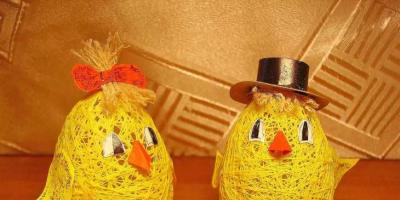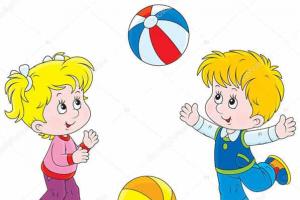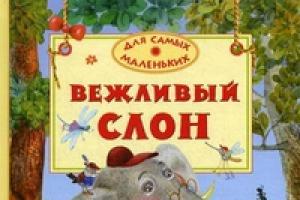Children are divided into teams. The players of one team show a small scene without words, in which some well-known proverb is encrypted, and the players of the second team try to guess this proverb. The game is played against time. If a team is unable to give the correct answer within 5 minutes, then the right to “show the proverb” goes to the other team.
I know more
Players are divided into teams. The presenter names a specific topic. For example, “sports”, “flowers”, “baked goods”, “women’s names” or another. And the teams try to remember and write down as many words as possible related to the specified topic for five minutes. The team that can come up with the most suitable words wins.
Trainers and predators
Players are divided into two teams - trainers and predators. A circle is drawn in the center of the playing area. The “trainers” are given stickers. The “trainer” must catch up with the “predator” and be able to stick a sticker on it, after which the “predator” is considered caught and is taken to the circle. The “trainers” team tries to catch and bring into the circle all the players from the “predators” team.
Air pointer
Players are divided into teams. Each team is given balloons and tape. Participants in the game need to inflate as many balloons as possible and use tape to connect them into a long pointer chain. The team whose air pointer is longer wins.
Let's tell fortunes by hand
A curtain or curtain is pulled in the room, in which there is a small hole for the hand. One team stands on one side of the curtains, and the other on the other side. Players on one team take turns putting their hand into the hole, and players on the other team try to guess who exactly the hand belongs to. The one who gives the most correct answers wins.
Word-noser
A player from one of the teams is invited - a “word bearer”. A topic is voiced to him, for example, “space,” “shop,” “school,” “sea,” or others. On this topic, he names the words that come to his mind. These words are written down. And then the rest of the team players are invited, the topic is announced to them, and they try to guess the written words. The winner is the team that guessed the most words, called the “word noser”.
Unbreakable connection
Players are divided into pairs. One of the pair names the word, and the other comes up with an association for it. For example, “elephant - trunk”, “bread - butter”, “key - lock”. Then all players are blindfolded and taken in different directions. After which they, shouting only one word, exactly the one their partner called, try to find each other and hold hands.
Indian name
Each player writes any adjective on one piece of paper, and any noun on the other. All adjectives go into one box and nouns into another. The contents of the boxes are then shuffled and each player goes to the boxes and draws one noun and one adjective. A combination of these words becomes his name for the whole day. Phrases can be very unexpected and funny. For example, “blue eye”, “cheerful cucumber”, etc.
School events and school holidays
Celebration of outdoor and sports games in the summer camp They won’t catch up with us...
Artichoke
Sports events in the summer camp are held throughout the day (in the morning - a sports match, before dinner - other events, awards - after dinner). The competition requires the participation of all teams, but division into age groups is provided.
Venue of sports games: stadium or large clearing.
Number of participants: 50-100 people.
Age of participants: 12-15 years old.
Material support for the sports festival:
- sports equipment for the match;
- props for competitions (balloons,
- thick rope (length - 2 m), tissue paper discs, hats, flags for the game “Defending the Banner”);
- cardboard medals;
- prizes.
Preparing for a sports festival at a summer camp
In preparation for the event, it is necessary to draw lots between squads for a sports match.
It is also necessary to inspect the place where the holiday will take place, clear it of debris, level the ground on the playgrounds, and mark the grounds.
Plan for a sports festival at a summer camp:
- Sports match.
- Warm-up games.
- Competitions.
- Game "Defense of the Banner".
- Quiz.
- Winner's reward ceremony.
Duration of the sports festival: 4 hours.
Sports match
The holiday begins immediately after breakfast with some kind of sports game (football, volleyball, basketball). There are several options for organizing and conducting games:
Carrying out a series of matches between teams.
Short mini-football competitions are best suited for this. If the ages of the children in the units vary greatly, it is necessary to create several age groups. Games can be played separately for boys and girls or in mixed teams. If possible, several games are played simultaneously.
2. Exhibition match (football) between two senior squads.
3. Football or volleyball match between teams of children and teachers.
When preparing matches, it is also necessary to organize fan teams.
Warm-up games at a sports festival
The second part of the holiday begins after lunch with fun games. For example, you can play the following games:
Game "Tail of the Dragon"
Participants stand in a row one after another and hold onto the belt of the player standing in front. The goal of the first player in the chain is to catch the last one. In this case, the chain should not break.
Game "Locust"
To play, you need to mark running tracks and start and finish lines. The distance varies from 30 to 50 m depending on the age of the participants. On command, participants run from start to finish. The last three players to arrive no longer participate in the race, but become “pests.”
In the next race, the “pests” try to stop the other children from running or force them to step off the edge of the treadmill. The three players who came last in the second race join the “pests”. All players who step over the edge of the treadmill become “pests”.
After this, the next race takes place. The game continues until one person remains at the start, who is considered the winner.
During the game, it is necessary to ensure that the “pests” do not use forceful techniques against other players.
This is an intellectual game during which the most erudite, smart and resourceful guys are identified. The competitions for it are selected in such a way that any number of people from the squad can participate in them. It may be that in one squad there will be five people who want to test themselves and their knowledge, and in another there will be only one. One winner is determined in each competition. He receives a star, which can then be exchanged at the Bank for a “scholarship” (camp money).
Competitions are won by those who:
Gave more correct answers faster than his competitors;
More precisely, he completed the task;
Completed the task correctly faster than his opponents.
It happens that by the end of a competition, 2-3 people come out with the same result. In this case, it is necessary to leave the main contenders on stage and continue the competition with them to accurately determine the winner.
Description of competitions
1. "Auction". As a warm-up, offer the kids a fairly simple competition: name nouns that start with the letter A and end with the letter Z.
2. “Yes - no.” Invite the children to raise their hands up if they think the statement you read is true and not to make any movement if they think it is false.
Attention! Or, to evaluate this competition, you must have very attentive assistants who mark the correct answers of all children, and this must be done very quickly so that the competition does not drag on.
Or you can send off the stage the guys who gave the wrong answers after each question.
1.1. Scissors can be sharpened by cutting sandpaper. (Yes)
1.2. Is it possible to give a Japanese man white flowers when meeting? (No. This is the color of mourning.)
1.3. A veil on a lady's hat provides warmth. (Yes)
1.4. It is easier to pull a wheelbarrow with vegetables behind you than to push it in front. (Yes)
1.5. Ships get stuck in the Sargasso Sea, becoming entangled in seaweed. (No)
1.6. The whale lets out fountains of water. (No. He is blowing air.)
1.7. There is enough gold in the sea to make every person on Earth a millionaire. (Yes)
1.8. The octopus turns almost black from fear. (No. White.)
1.9. Camels, while traveling through deserts, store water reserves in their humps. (No. The humps are filled with lard. Due to this, camels live in the complete absence of food.)
1.10. Every seventh wave is higher than the previous six. (No)
1.11. Ladybugs bite when they are angry. (No. But when they are harassed, a blood-like fluid oozes from their joints, which is caustic and irritates the skin.)
1.12. Owls hear a cockroach crawling on the ground. (Yes)
1.13. During mating fights, male vipers beat their opponent to death. (No)
1.14. Bats can run on the ground. (Yes)
1.15. The grammastola (hairy) spider eats young rattlesnakes. (Yes)
1.16. Albino grasses grow in caves. (Yes)
1.17. The giant squid, in pursuit of its prey, reaches speeds of over fifty kilometers per hour. (Yes)
1.18. Islam is the oldest of the world's religions. (No. The youngest.)
1.19. Is the film “Black Tulip” based on the novel of the same name by Alexandre Dumas? (No)
1.20. Did Stevenson write the novel The Mysterious Island? (No. Jules Berne)
1.21. The cobra has a poisonous sting. (No. The cobra does not sting like insects, but bites with its teeth. Venom enters the victim through the holes.)
1.22. The heaviest vegetable is cabbage. (No. Pumpkin.)
1.23. The Arabs believe that the hundredth Name of Allah is known only to the donkey. (No. The camel. That's why he is so proud and arrogant.)
3. “Both this and that.” The presenter reads out adjectives that can become definitions for the same word. We need to name this word faster than our opponents.
3.1. And sea, and beer, and soap... (Foam)
3.2. And snowy, and rum, and stone, and grumpy... (Baba)
3.3. And German, and postal, and excise... (Stamp)
3.4. And Finnish, and table, and dull, and sharp... (Knife)
3.5. And water, and air, and financial, and stormy... (Flow)
3.6. And square, and cubic, and linear... (Meter)
3.7. And verbal, and fencing, and bloody... (Duel)
3.8. And underwear, and bedding, and thin... (Lingerie)
3.9. And spreading, and rotten, and fruity... (Tree)
3.10. And joyful, and sad, and mocking... (Smile)
3.11. And active, and gambling, and ancient... (Game)
3.12. And machine gun, and satin, and adhesive... (Tape)
3.13. And hidden, and gas, and single... (Camera)
3.14. And fake, and gold, and small, and rare... (Coin)
3.15. And healthy, and milky, and rotten... (Tooth)
3.16. And broken, and tinted, and magnifying... (Glass)
3.17. And aristocratic, and bad, and pleasant... (Manners)
3.18. And satin, and quilted, and terry... (Robe)
3.19. Both oil and key... (Well)
3.20. Both cardiac and safety... (Valve)
3.21. O crown, and empty, and hotel, and ordinal... (Number)
3.22. And English, and coded, and barn... (Castle)
3.23. And the dead one, and the rope, and the door... (Loop)
3.24. And yellow, and white, and student, and travel, and entrance... (Ticket)
3.25. And gaming, and geographical, and topographical, and political, and large-scale... (Map)
3.26. And new, and maple, and lattice... (Canopy)
3.27. And smoke, and tolovaya, and spicy, and Cossack... (Cheshka)
3.28. Both hockey and tennis... (Court)
3.29. And Olympic, and plush, and clubfoot... (Bear)
3.30. And high, and steep, and copper... (Mountain)
4. “Warm-up for the mind.” You must answer the questions written on the tickets. If you answered, you continue to play; if you didn’t answer, you’re out.
4.1. Name something that any person has, but the biblical Adam could not have. (Navel)
4.2. What can a good singer lose, but a bad singer still won’t get it? (Voice)
4.3. Name glasses that allow you to control yourself. (Lorgnette)
4.4. Which master has selfish interests? (Furrier)
4.5. A man is sitting, and you cannot sit in his place, even if he gets up and leaves. Where is he sitting? (On your lap.)
4.6. Whoever does not have it does not want to have it, whoever has it cannot give it away. What is this? (bald)
4.7. She has not done a single stupid thing, but is considered a symbol of stupidity. What is this? (Cork)
4.8. What masculine word means queen? (Queen)
4.9. How can you fill a bucket to the brim three times without emptying it? (First pour stones, then sand, then pour water.)
4.10. Which doctor often has to extract the root? (To the dentist)
4.11. What architectural structure contains a large amount of intelligence? (Ward)
4.12. What eggs have never been laid by anyone? (Kinder Surprise)
4.13. What kind of thing, despite its small size, is allocated a separate room in the apartment? (Toilet)
4.14. What atavism puts you at risk of going under the knife? (Appendicitis)
4.15. What kind of person talks about the same thing for the thousandth time with apparent pleasure? (Guide, tour guide, art critic)
4.16. What kind of guard does a person create in his own image and likeness? (Scarecrow)
4.17. Who walks while sitting? (Chess player)
4.18. There is one word in the Russian language that is always pronounced incorrectly. What is this word? (Wrong)
4.19. Why can't a man living in Kyiv be buried east of the Volga River? (Because he's still alive.)
4.20. How many animals did Moses take into his Ark? (Not at all. Noah had the ark, not Moses.)
4.21. Is it allowed in Turkmenistan to marry your widow's sister? (If a man's wife is a widow, then he is already dead.)
4.22. What becomes easier when it is filled? (Balloon)
4.23. You are competing and have passed the runner in second position. What position do you take now? (Second)
4.24. You have passed the last runner. What position do you take now? (This is impossible. If you are running after him, then he is not the last.)
4.25. Mary's father has five daughters: 1. Chacha. 2. Cheche. 3. Chichi. 4. Chocho. What is the name of the fifth daughter? (Mary)
4.26. Two Americans are standing at the entrance to the British Museum. One of them is the father of the other's son. How is this possible? (They were husband and wife.)
5. “What and how much?” The children are given cards according to the number of questions and markers. Having solved the problem, they must write the answer with a marker and raise the card above their head.
5.1. How many nines are there in numbers from 1 to 100? (Twenty)
5.3. What sign must be placed between 2 and 3 to make a number greater than two but less than three? (Comma)
5.4. How many times is the larger single-digit number smaller than the larger two-digit number? (99:9 = 11 times)
5.5. How much will you get if you subtract the number expressed by five units of the first digit from a number expressed by three units of the second digit? (30 - 5 = 25)
5.6. How many units less is the largest single-digit number than the largest two-digit number? (99 - 9 = 90)
5.7. Name two numbers such that their sum and difference equal three. (3 and 0)
5.8. How much do you get if you subtract the largest six-digit number from the smallest seven-digit number? (1)
5.9. How much do you get if you add the smallest two-digit number to the largest four-digit number? (9999 + 10 = 10,009)
5.10. The guys probably know how to write Roman numerals within ten. But the numbers indicating large values will need to be drawn on the poster: L 50, S 100, D 500, M 1,000.
The presenter shows cards on which Roman numerals are written, the guys write the same values on their cards, in Arabic numerals that are familiar to us:
5.11. Old Church Slavonic numbering is based on almost the same rule as the Roman one: several letters under the title (this is a dash on top of the letter), written side by side, indicate a number equal to the sum of the numbers indicated by the letters. At the same time, numbers less than a thousand, but more than twenty, are written in the order in which they are pronounced, that is, from left to right. Hang a poster with a picture in front of the children. (See below.)
.jpg)
The presenter dictates the number in Old Church Slavonic. Children must write it in Arabic (modern) numerals:
5.12. When denoting numbers less than 20 and greater than 10, the letter denoting one is placed in front of the letter denoting ten. Dictate the following numbers to the children:
.jpg)
5.13. The poster has Chinese numbers written on it. The presenter pronounces the numbers in Russian, one for each player, and the children call them in Chinese. (See picture below.)
.jpg)
6. “Equivalents of proverbs.” It is necessary to name a Russian proverb, which in meaning coincides with the foreign one.
6.1. English proverbs:
6.1.1. Good thoughts come later. (A good thought comes later.)
6.1.2. Wealth makes friends; need tests them. (Friend is known in trouble.)
6.1.3. Stand in the mud. (Sit in a puddle, galosh.)
6.1.4. Silent as the grave. (Mute like a fish.)
6.2. Armenian proverbs:
6.2.1. Every failure is an edification. (You learn from mistakes.)
6.2.2. Anyone who is friends with a crow will also dig in the dung. (Whoever you get along with, that’s how you’ll gain. To live with wolves, howl like a wolf.)
6.2.3. No matter what you tell him, he still drives his donkey. (At least there’s a stake on your head.)
6.3. Bashkir proverb:
6.3.1. Where they don’t know you, they respect your fur coat. (They greet you by their clothes, they see you off by their intelligence.)
6.4. Belarusian proverb:
6.4.1. In its time, the pine is red. (Every vegetable has its time.)
6.5. Buryat proverb:
6.5.1. The first pig is blind. (The first pancake is lumpy.)
6.6. Indonesian proverb:
6.6.1. The squirrel jumps very quickly, but sometimes it breaks down. (The horse has four legs, and then stumbles.)
6.7. Chinese proverbs:
6.7.1. If you save a handful a day, in ten years you will buy a horse. (Fluff to feather - there will be a feather. A penny saves the ruble.)
6.7.2. If he meets a person, he speaks like a human, if he meets a devil, he speaks like a devil. (Both ours and yours.)
6.7.3. Eyes can see a thousand miles, but cannot see their own eyelashes. (Can’t see beyond his own nose.)
6.7.4. If there is no tiger in the mountains, then the monkey is the prince. (In the absence of fish, cancer is a fish. Between the blind and the crooked, there is honor.)
6.8. Lithuanian proverb:
6.8.1. If you don't crack the nut, you won't eat the kernel. (If you don't drown, you won't burst.)
6.9. Mari proverb:
6.9.1. I haven't tried salt yet. (The milk on the lips has not yet dried.)
6.10. Mordovian proverb:
6.10.1. And there is rubbish in the wheat. (Every family has its black sheep.)
6.11. German proverb:
6.11.1. Foxes are caught by foxes. (Fight fire with fire.)
6.12. Persian proverbs:
6.12.1. The grass in the goat's mouth is sweet. (Tastes could not be discussed.)
6.12.2. The sour curdled milk can be seen in the pot. (You can see the bird in flight.)
6.13. Polish proverb:
6.13.1. Small rain from a big cloud. (The mountain gave birth to a mouse.)
6.14. Turkmen proverb:
6.14.1. To the one who knows - it is light, to the one who does not know - it is dark.) Teaching is light, ignorance is darkness.)
6.15. Uzbek proverb:
6.15.1. It is better to be a shepherd at home than to be a padishah in a foreign land. (It is better to be the first in the village than the last in the city.)
6.16. Finnish proverbs:
6.16.1. And the old fox's head may get stuck in the jug. (And the old woman gets screwed.)
6.16.2. For livestock and bedding. (It’s a hat after Senka.)
6.16.3. If the father drinks the horse, the son will drink the cart. (The apple never falls far from the tree.)
6.16.4. In its field the plow is not heavy. (He doesn’t carry his own burden.)
6.17. French proverb:
6.17.1. Separation is the death of love. (Out of sight, out of mind.)
6.18. Japanese proverb:
6.18.1. With a sparrow's tear. (With a gulkin nose. The cat cried.)
Notes:
In addition, competitions “Auction”, “This and that”, “Warm-up for the mind”, “Say by...”, “Equivalent of proverbs” - can be held with the entire audience and stars can be awarded to everyone who gave the first answer.
If the children want, they can determine the most gifted child by inviting those who have the largest (and most importantly!) equal number of stars to play the game “The Most-Most.” The presenter reads out the definition - you need to name what is being discussed faster than your opponent:
7. “The very best.”
7.1. The deepest ocean. (Quiet)
7.2. The saltiest sea. (Dead)
7.3. The shallowest ocean. (Atlantic)
7.4. The largest musical instrument. (Organ)
7.5. The largest stringed instrument. (Double bass)
7.8. The largest island belonging to Russia. (Sakhalin)
7.9. The largest island on Lake Baikal. (Alder)
7.10. The largest volcano in Russia. (Klyuchevskaya Sopka)
7.11. The smallest state in the world. (Vatican)
7.13. The largest river in the world, flowing from West to East. (Amazon)
7.14. The coldest pole on Earth. (Southern)
7.20. The largest city in Western Europe. (Paris)
7.21. The largest city in the USA. (NY)
7.22. The most prickly flower. (Cactus)
7.27. The largest tributary of the Yenisei River. (Angara)
7.28. The largest land mammal. (Elephant)
7.31. The most famous hero of the books by Ilf and Petrov. (Ostap Bender)
7.32. The largest state in Latin America by area. (Brazil)
7.33. The most common lighting device in fifteenth-century Russia. (Luchina)
7.34. The most famous composer of organ works. (Johann Sebastian Bach)
7.35. The longest sleep a person can fall into. (Lethargic)
7.36. The biggest seed. (Coconut)
7.37. The most common word coined by the Czech writer Karel Capek. (Robot)
7.38. The most abundant chemical element in the Universe. (Hydrogen)
7.39. The most terrible natural phenomenon in terms of destructive power. (Earthquake)
7.40. The most populous city in Europe. (Moscow)
7.41. The most domesticated insect in Europe. (Bee)
7.42. The greatest English playwright. (William Shakespeare)
7.43. The best diver among mammals. (Sperm whale)
7.44. Our tree that scatters the most seeds per year. (Poplar)
7.46. The largest reptile living on Earth today. (Crocodile)
7.47. The most fusible metal. (Mercury)
7.48. Who among the inhabitants of the animal world develops the highest speed (Falcon. Three hundred kilometers per hour.)
7.49. The largest circus of Ancient Rome. (Coliseum)
7.50. The most numerous class of the animal world, by number of species. (Insects)
7.51. The highest speed in nature known to modern science. (Light. Three hundred thousand kilometers per second.)
7.52. Name the founder of the very first Russian university. (Mikhailo Vasilievich Lomonosov)
7.54. The largest rodent in Russia. (Beaver)
7.56. Which animal has the longest life expectancy? (Giant, or Elephant, tortoise - 180 years.)
7.57. The most ancient (first) book on the history and geography of the Russian Land. (“The Tale of Bygone Years.”)
7.58. Name the sea that washes the largest number of states. (The Caribbean Sea washes 22 states.)
7.59. Name the most frost-resistant bird. (Domestic goose can withstand temperatures of 110 degrees)
7.60. The most famous Italian opera house. (La Scala)
7.61 The smallest mammal on Earth. (Shrew)
7.62. Tallest building in Washington. (Capitol)
7.63. The most refractory metal. (Tungsten)
7.64. The most populous city in the world. (Mexico City)
7.67. Tallest building in Paris. (Eiffel Tower)
7.68. The bird has the largest beak. (Pelican)
7.69. A mammal that has adapted to live at the highest altitude above sea level. (Yak)
7.71. The animal with the biggest ears. (Elephant)
7.72. Tallest mammal. (Giraffe)
7.73. The largest mammal living today on our Planet. (Blue whale)
7.74. Which animals gather in the largest herds? (Gazelles. A herd can cover an area of 24 kilometers x 150 kilometers.)
7.75. Which bird dives the deepest? (Penguin)
7.76. The smallest continent in area. (Australia)
7.77. The fastest sea animal. (Orca dolphin)
7.79. Which animal has the longest tongue? (At the anteater.)
7.81. Which sea animal has the longest horn? (At the narwhal unicorn.)
7.82. Which insects have the largest nests? (In termitlv.)
7.83. The deepest lake in the world. (Baikal)
School events and school holidays
Fun event at summer camp Fun Fair
Artichoke
Conducting games and competitions for the entire camp.
Event location: summer camp playground.
Number of participants: 50-100 people.
Age of participants: 10-15 years.
Material support:
- props for competitions at stations;
- station map;
- auction prizes;
- toy money;
- prizes for sale.
Preparing for a summer camp event
In preparation for the holiday, it is necessary to arrange tables for “stations”, prepare and distribute the necessary props. It is desirable that the “stations” cover a fairly large area.
For orientation between them, you can draw a diagram of their location and hang it in a visible place (a better, but more labor-intensive option is to make diagrams for each participant).
In addition, for the holiday it is necessary to prepare “money”, which participants will receive for completing tasks, and prizes that can be purchased for this “money” in the fair shop.
Shops can also be placed in several places (by indicating their location on the map). Do not forget to calculate that the “sold” goods provide all the “money” issued.
Another interesting event for the fair is an auction, which can be held after the main part of the holiday to raffle off the remaining “money”.
Camp event plan:
- Introduction.
- Running through the “stations”.
- Fair shops.
- Auction "Pig in a poke".
Event duration: 2 hours.
Introduction
As an introduction, you can tell the children the rules of the holiday, show on the map what stations there are, where the “shops” are located.
Running through the “stations”
For “stations” you can come up with any tasks that can be completed quickly and easily. The “fee” for completing a task may depend on its complexity. If the task involves competition between several participants, the winner receives the main “cash” prize, the remaining participants are necessarily awarded small incentive prizes. A participant who has earned “money” from a “station” cannot participate in the same competition again.
1. Tongue twister station.
Participants are asked to pull out a piece of paper with a written tongue twister from the bag and pronounce it.
Examples of tongue twisters
In the shallows we lazily caught burbot.
You replaced my burbot with tench.
Have you watered the lily? Have you seen Lydia?
Cavaliers to the Queen
They sailed in a caravel.
The jackal walked, the jackal galloped.
The priest is standing on his head, the cap is on his butt,
a shock under the priest, a priest under the hood.
Popcorn bag.
Sashka has cones and checkers in his pocket.
You can’t talk through all the tongue twisters, you can’t over-speak them all.
We bought Valerika and Varenka
Mittens and felt boots.
Buy a pile of spades.
2. Station of ditties.
Participants are invited to sing any ditty and receive a prize for it.
3. Station of riddles.
Participants are asked to guess the riddle. Those who guess correctly (possibly several people at once) receive a prize.
Examples of riddles with a trick
Who likes to run around on branches?
Of course, red... ( Squirrel)
Knows a lot about raspberries
The owner of the forest, brown... ( Bear)
Who is beating like a drum?
Sitting on a pine tree... ( Woodpecker)
Who is not friends with bright light,
Underground in winter and summer?
He dug up the entire slope with his nose.
It's just gray... ( Mole)
Who is trembling under the tree in the forest,
So as not to meet with a double-barreled shotgun?
He gallops across the field, emboldened.
This beast is called... ( Hare)
This beast sleeps in winter,
He looks awkward.
Loves berries and honey.
And it’s called... ( Bear)
In the thicket, with my head raised,
Howling from hunger... ( Wolf)
Daughters and sons
Teaches you to grunt... ( Pig)
From the palm tree down, to the palm tree again,
Jumps deftly... ( Monkey)
The tail is a fan, there is a crown on the head,
There is no more beautiful bird than... ( Peacock)
4. Origami station.
Participants are invited to make a paper figurine (with the help of the facilitator or independently).
5. Attraction “Hand Golf”.
For the competition you need to make a handmade golf course from a shoebox. To do this, the box is turned upside down and a hole is cut at the bottom into which a tennis ball should freely pass. The lid of the box is placed on top of it in a heap so that a ball can be rolled along the lid.
The task for the participants is to roll the ball into the box.
6. Attraction “Burst the Ball!”
Each player has a balloon tied to his right leg (ankle). After the starting signal, all participants try to break through the balls of other players and save their own ball. Players whose balloon pops are eliminated from the game. The last person remaining in the game is declared the winner. All participants receive incentive prizes.
7. Attraction "Cockerels".
A circle with a diameter of 2 m is drawn on the ground. Two people participate in the competition at the same time. Each participant stands on his right leg, holding his left leg by the ankle with his right hand. The left hand is hidden behind the back. The goal of the players is to push the opponent out of the circle. The one who does this is declared the winner. In addition, a participant who lets go of his left leg or uses his hands during the “fight” is considered a loser.
8. “Tear off the hat” attraction.
The presenter calls two opponents and puts hats on their heads. Each participant presses his left hand to his body and has no right to use it during the game. The players' task is to rip off the opponent's hat with their right hand, while keeping their own on their head. The winner is the participant who completes the game task first.
9. Attraction "Ring throw".
To play, you need to make several rings from thick rope. The task for the participants is to throw a rope ring over a stick dug into the ground.
10. Skomorokhi station.
At this station, participants are invited to perform a short variety act (sing a song, recite a poem, show a pantomime, etc.).
11. Tricky task station.
Participants are asked to solve a problem. Those who find the correct or original answer to the problem (possibly several people at once) receive a prize.
Sample problems
Which clock shows the exact time only twice a day?
Answer: A clock that has stopped.
What is lighter: a kilogram of cotton wool or a kilogram of iron?
Answer: They have equal weight.
When is the easiest time for a black cat to get into the house?
Answer: When the door is open.
How to write the word "mousetrap" in five letters?
Answer: cat.
What rocks are not in the sea?
Answer: dry.
What three numbers, when added or multiplied, give the same result?
Answer: 1, 2 and 3.
When are hands pronouns?
Answer: when they are you-we-you.
What female name consists of two letters that are repeated twice?
Answer: Anna, Alla.
One egg is cooked for 4 minutes. How many minutes should you boil 6 eggs?
Answer: 4 minutes.
Where is the end of the world?
Answer: where the shadow begins.
12. Stikhoplety station.
Participants are asked to compose a quatrain containing a pair of given rhymes.
13. Station Geographical Society.
Participants are asked questions. Those who answer the question receive a prize.
Sample questions
How many continents are there in total? ( Six)
What oceans do you know? ( Pacific, Indian, Atlantic, Arctic)
Where is Brazil? ( In Latin America)
Capital of France? ( Paris)
Brussels is the capital of which country? ( Belgium)
The inhabitants of this country call it Suomi, but what do we call this country? ( Finland)
Which country is called the Land of the Rising Sun? ( Japan).
The world's highest mountain? ( Everest).
In what country is Sydney located? ( In Australia)
What is the zero parallel called? ( Equator).
15. Competition Hit the target.
The game "Darts" is required for the competition. Participants compete in throwing darts at a target and receive a reward based on the accuracy of their throw.
16. Competition Catch the candy.
A candy is tied to one end of the thread, the other end must be secured to the visor of the cap so that the candy is at the level of the chin of the person wearing the cap. Participants in the competition take turns putting a cap on their head and try to catch the candy with their mouth, without using their hands. The one who succeeds receives a prize.
Fair shops
At the same time as the stations, “shops” begin to operate. It is best to place them in different places and divide them according to the range of “sold” goods.
Examples of stores:
- cafe (“sale” of juices, sparkling and mineral water (in glasses), various buns and sandwiches). It is advisable to place several tables next to it or organize a “cafe” right in the dining room;
- food kiosk (“sale” of chocolates, sweets, chewing gum);
- “a thousand little things” (“sale” of small prizes - stationery, small toys, etc.);
- bookstore (“sale” of small books, crosswords, magazines);
- win-win lottery (drawing of various prizes).
Auction “Pig in a poke”
The auction is held for children who did not have time to spend the “money” they earned. The interesting thing about the auction is that the lot is not shown to participants until the end of the drawing. The presenter only gives an approximate or humorous description of the item and names its initial cost.
Participants offer their bets and the one who reports the highest amount receives the item being played and finds out what it is. Thus, 5-10 lots can be played in the auction. In this case, it is necessary to alternate between valuable and funny prizes.
Examples of lots and comic descriptions for them
- the item is edible and necessary for all of us ( salt);
- something sticky ( candy);
- small that can become big ( balloon);
- business person subject ( notebook);
- an item for those who want to leave their mark ( colored chalk);
- set of young artist ( pencil and sheet of paper);
- set of young writer ( pencil and sheet of paper);
- set of young mathematicians ( pencil and sheet of paper);
- item to satisfy hunger ( bread).
The layout of the “stations” and “shops” needs to be thought through and ensure that there is an even distribution of participants between them so that there are not long queues or too many people crowding around the stations. Each child who took part in the competition should receive a small reward, regardless of the success of his actions.
The time of childhood is the time of games and entertainment. We offer a series of competitions and games for schools and camps.
COMPETITIVE GAME PROGRAMS
Competitive game programs (CGP) can be conducted both within a school or children's camp, and within a class or squad. The instrumentation scheme is simple:
1. Competitions. Emphasis on the moment of competition (the child performs actions in front of an audience).
2. Game form. There must be an element of play and entertainment.
3. Inclusion of the maximum number of children in competitions, so that everyone can try their hand at one or another competition.
4. Rewarding not only the winners, but also the participants of the competition.
In our opinion, it is inappropriate to write out the text for those who conduct the control panel, since in the competitive game program all the pre-prepared words of the presenters are often not spoken out. Instead, there is a live dialogue between the presenter and the competing participants.
Sherlock Holmes and Miss Marple
The lesson develops imaginative thinking and logic.
The hosts (Miss Marple and Sherlock Holmes) announce that they are looking for assistants. All applicants are offered a series of test-competitions.
"Fingerprints" . The task is to find the same pair of handprints on a sheet of paper and determine which of those sitting in the hall they belong to.
"Very sharp eye". Participants are shown a set of objects. Then the participants turn away. At this time, one item is replaced. It must be said that they have changed.
"Savvy" . You need to guess who the things belong to: glasses, spatula, mirror, robe, board, salt whistle, diploma, badge.
“Find by description.” Participants are asked to find, based on the description, a person from another squad who is also in the hall.
"Silent Action" . As quietly as possible, lower the spoon into the glass, close the pan with a lid, and place the fork on the plate.
"Siamese twins". The hands of those standing next to them are tied, the task of each pair is to tie the laces on the shoe, cut out a circle from paper, light a candle, etc.
Book of records...
The activity increases psychological comfort and the level of cohesion in the children's team.
The presenter suggests starting your own book of records. And call it exactly what the detachment is called (camp, school, etc.).
"The most amazing." For 1 minute, the teams write on a piece of paper how their team differs from all the others, how it can surprise all the other teams.
"Strongest". Participants in the competition are invited to hold one of the smallest teachers in their arms. Only the two strongest students remain on stage.
"The most spiritual" . Two participants need to blow a tennis ball off a flat surface while blindfolded. When the contestants are blindfolded, a plate of flour is placed instead of the ball.
"The most resourceful." Participants in the competition take off one sneaker or shoe at a time (the main thing is that the shoes have laces) and place them in a circle. They are then blindfolded. Everyone must find their own shoe and tie it. The one who completes the task first wins.
"The fastest". Each participant is given a ribbon. In 30 seconds you need to tie tight knots on it (the more, the better). Then the participants exchange ribbons. The task is to untie all the knots. Who is faster?
"The most numerous." You need to gather as many people from your expedition as possible into the hoop.
"The most athletic" (carrying out a relay race). Two teams are participating. You need to do the following:
Run to the chair;
Turn it over;
Wear a skirt and scarf;
Sit on a chair;
Shout “Hurray”;
Take things off and turn the chair over;
Return to next participant.
"The most sensual." On the girls, the young contestants stick hearts from self-adhesive paper anywhere. Then the boys are blindfolded, the girls are changed. You must remove all the hearts without prompting.
"The most united." If the presenter says: “Unwound,” then all participants spread their arms to the sides. If the leader says: “I’m stuck with the neighbor on the right,” then the participants hug the one sitting on the right. You can “wind up” with the neighbor on the left, behind, in front, and finally, all together.








